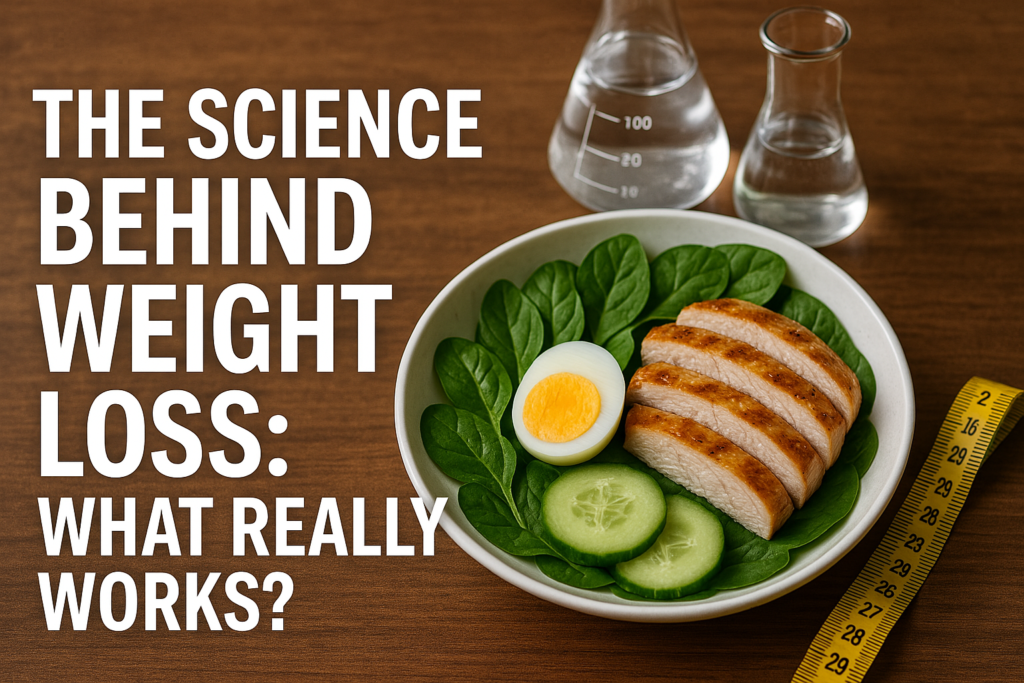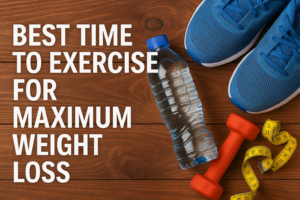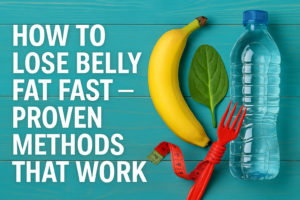Nowadays, everyone dreams of staying fit and healthy. But weight loss can be a tricky process if you don’t understand the science behind it. In this article, we will explain the science behind weight loss – what truly works and what are just myths. This article is written in simple Hinglish so that everyone can understand it easily.
Table of Contents
- What is Weight Loss?
- The Role of Calorie Deficit
- Effect of Metabolism
- Exercise vs. Diet – What’s More Important?
- Balance of Protein, Carbs, and Fats
- Does Intermittent Fasting Work?
- Role of Sleep and Stress
- How Hormones Affect Weight Loss
- Crash Diets – Do They Work or Not?
- Tips for Long-Term Weight Loss
1. What is Weight Loss?
Weight loss means reducing your body fat and overall weight. When you give your body fewer calories and burn more energy, weight loss happens. But just seeing lower numbers on the scale is not real weight loss. Your goal should be fat loss, not muscle loss.
2. The Role of Calorie Deficit
The basic principle of weight loss is a calorie deficit. When you consume fewer calories than you burn in a day, your body converts stored fat into energy.
How to Calculate?
- The average adult needs 2000–2500 calories daily.
- For weight loss, you need a deficit of 500–800 calories.
Example: If your maintenance calories are 2200, then consuming 1700 calories will help in weight loss.
3. Effect of Metabolism
Metabolism is the process by which your body uses energy. Everyone’s metabolism is different – some have fast, some have slow.
How to Improve It?
- Do regular exercise
- Eat a protein-rich diet
- Get proper sleep
- Reduce stress
Improving metabolism helps your body burn more calories and lose weight faster.
4. Exercise vs. Diet – What’s More Important?
Many people ask: “Is diet or exercise more important for losing weight?”
The Answer:
- Diet is 70%
- Exercise is 30%
If you only exercise but eat unhealthy food, you won’t get results. A combination of both is necessary.
Best Exercises for Weight Loss:
- Walking / Jogging
- HIIT (High Intensity Interval Training)
- Strength training
- Yoga
5. Balance of Protein, Carbs, and Fats
A balanced diet plays a key role in weight loss. Just reducing calories isn’t enough – a proper balance of nutrients is also important.
Macronutrient Ratio:
- Protein: 30–35%
- Carbs: 40–50%
- Fats: 20–25%
Best Foods:
- Protein: Eggs, chicken, paneer, lentils
- Carbs: Brown rice, oats, fruits
- Fats: Nuts, seeds, avocado
Protein helps build muscles, which boosts metabolism.
6. Does Intermittent Fasting Work?
Intermittent Fasting (IF) is an eating pattern with fasting and eating windows. A popular method is 16:8, where you fast for 16 hours and eat during an 8-hour window.
Benefits:
- Reduces calorie intake
- Controls insulin levels
- Increases fat burning
IF is great for those who want time-based control over their meals.
7. Role of Sleep and Stress
People often don’t link sleep and stress to weight loss, but both are very important.
Poor Sleep Causes:
- Increased cravings
- Low energy levels
- Slower metabolism
Effects of Stress:
- Increased cortisol (a fat-storing hormone)
- Overeating (emotional eating)
So, get 7–8 hours of proper sleep and use stress-management techniques like yoga and meditation.
8. How Hormones Affect Weight Loss
Hormones like insulin, leptin, ghrelin, and cortisol play a big role.
Key Points:
- If insulin is unbalanced, your body stores more fat
- Leptin makes you feel full
- Ghrelin is the hunger hormone
- Cortisol is the stress hormone
Your hormones need to be balanced for effective weight loss.
9. Crash Diets – Do They Work or Not?
Crash diets involve very low calories or eating only one type of food. They may give short-term results but are harmful in the long term.
Problems with Crash Diets:
- Nutrient deficiency
- Muscle loss
- Low energy
- Weight regain
Solution:
Follow a sustainable diet plan that you can maintain long-term.
10. Tips for Long-Term Weight Loss
Want your weight loss to be permanent? Then follow these simple tips:
Practical Tips:
- Do 30 minutes of walking or activity every day
- Avoid junk and sugary foods
- Include protein in every meal
- Drink more water (8–10 glasses)
- Practice portion control
- Track your progress (weight, inches, photos)
- Keep cheat meals occasional
- Stay patient and consistent
Conclusion
Weight loss isn’t magic – it’s science. If you understand the science – calorie deficit, proper nutrition, good sleep, stress control, and a balanced routine – you can lose weight in a healthy way.
The science behind weight loss clearly shows that the same method doesn’t work for everyone. But if you plan according to your body’s needs, results are guaranteed.
Start your weight loss journey today, with smart strategies and scientifically proven methods. 💪




